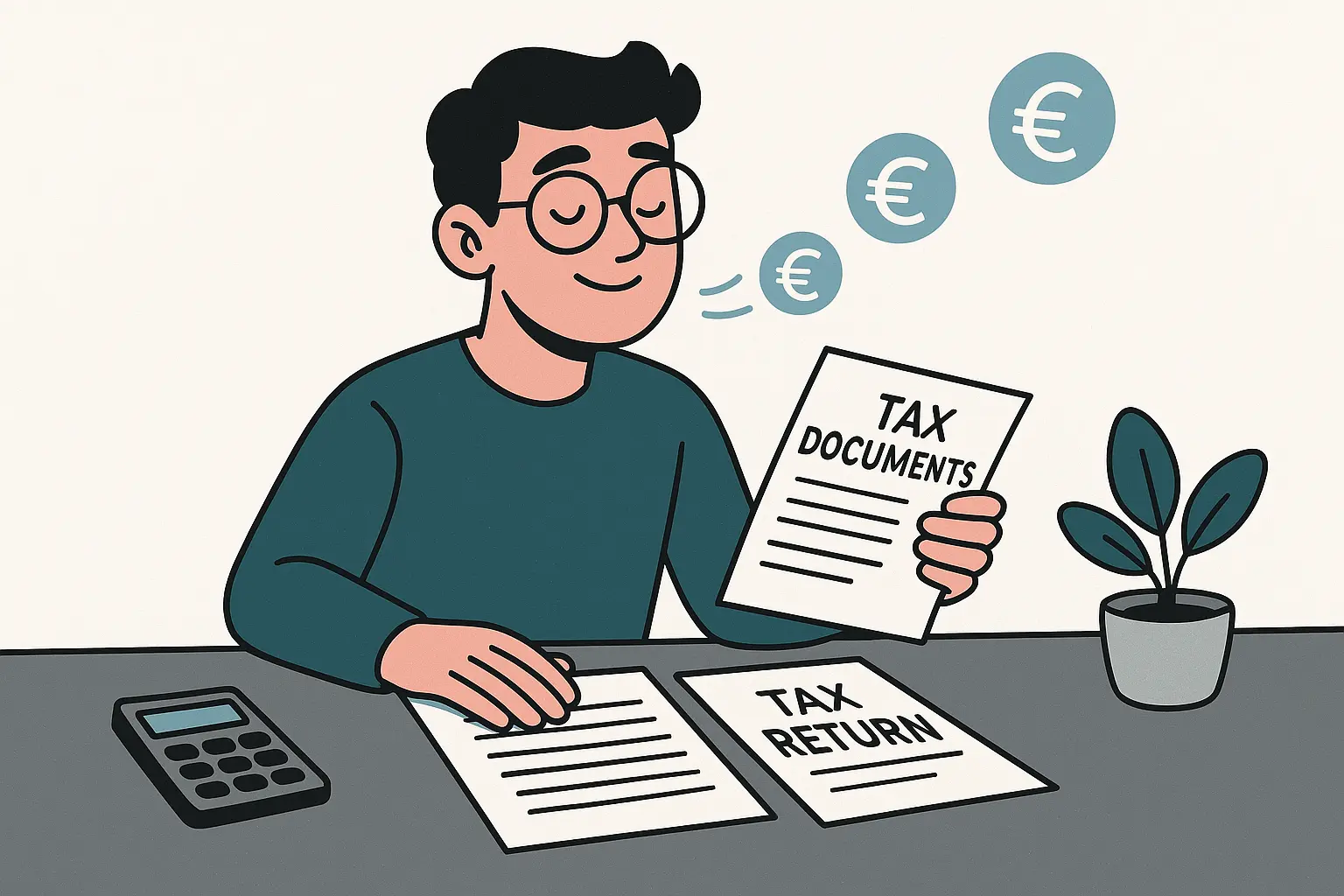This article is written for newly incorporated Irish companies and their directors who need to understand tax registration requirements.
It's particularly relevant for startup founders and business owners who have just received their CRO number and need to navigate the Revenue registration process.
Key Takeaways:
- Companies must register for corporation tax within 30 days of commencing "trading", with failure to comply potentially resulting in fines and penalties
- Registration requires obtaining a CRO number first, followed by a four-step process to set up Revenue Online Service (ROS) access
- VAT registration becomes mandatory when turnover exceeds €42,500 for services or €85,000 for goods within a 12-month period (as of 2025)
- The ROS Digital Certificate acts as a secure key for accessing Revenue services and should be safely stored with multiple backup copies
- Corporation tax registration is mandatory for all Irish companies regardless of profitability, while VAT and PAYE/PRSI registration requirements depend on specific business circumstances

So, you've just incorporated your limited company in Ireland. Congratulations!
If you haven't already set your company up, you should go choose one of our packages and set up with Open Forest - that way you can ignore the rest of this article because we will do it for you!
Now, before you dive headfirst into growing your business, there's an essential step you can't afford to miss, making the Revenue Commissioners happy by registering for tax.
It may not be the most exciting part of launching a startup but getting this right from the beginning will save you a lot of headaches down the road. Here we break down everything you need to know about tax registration in Ireland.
While you may save some small amount of cash doing it yourself, we recommend that you use us to do it for you so that you can stay focussed on your business. The below process takes time and can be a real distraction.
Why Is Tax Registration in Ireland Important?
Every newly incorporated company in Ireland is required by law to register for corporation tax within 30 days from trading. Failing to do so can result in fines, penalties, and even legal action.
It's common practice in Ireland to just register in the first 30 days after incorporation, whether you made any money or not.
Once you're registered, you can access various government supports and tax reliefs that can significantly benefit your business. So, let's make sure you're in good standing with Revenue right from the get-go.
Step 1: Get Your CRO Number
Before you can start your tax registration, you’ll need a Company Registration Office (CRO) number. This number is your company’s official identity in the eyes of the Irish government. When you incorporate your limited company with the CRO, you’ll receive a unique number. Keep this number handy as you’ll need it to register for tax.
You will find the number on your Certificate of Incorporation, see “Register Number” below:

Alternatively, you can go to https://core.cro.ie/ and search for your company name where you will find your CRO number (see below).

If you are an Open Forest client, you will be able to find your CRO number on your Open Forest Dashboard.
Step 2: Register with Revenue Online Service (ROS)
Once you have your CRO number, the next step in your tax registration journey is to set up an account with the Revenue Online Service (ROS). ROS is the Irish government's digital platform for managing all your tax obligations.
There are a few annoying steps to do this, so do them in this particular order:
2.1 - Get a Tax Number
To get a tax number, you need to register for any type of tax. Types of tax include corporation tax, VAT, PAYE etc. VAT and PAYE are dependent on what’s going on with your particular business but corporation tax is mostly unavoidable so take the simple approach and register for just corporation tax for now, it’s the easiest way to get a tax number. Remember, you have to do this within 30 days of when you start trading anyway.
To register for corporation tax, you have to fill out Form TR2. Just complete Parts A and B for now, you can register for VAT and PAYE later. Once you have completed the form, you have to email it to: businesstaxesregistrations@revenue.ie
Revenue will process the application and then issue you a tax registration number by post.
2.2 - Apply for your ROS Access Number (RAN)
Once your tax number arrives by post, you’ll need to use it to apply for your RAN number.
Go to the Revenue Online Service Registration Page and choose “Apply for your RAN”.
Then choose “Individual or Company”, then choose “Corporation Tax” and put in the Registration Number that arrived in the post (see below).

Once again, this number will be sent to you by post. Revenue really need to move this to digital…
2.3 - Apply for a Digital Certificate
Moving back again to the Revenue Online Service Registration Page:

Choose “Apply for your Digital Certificate”. You will be asked to input your RAN number that arrived by post.
Once you do that, you can “Download and Save your Digital Certificate”. This is a small file that you have to keep really safe. When trying to access ROS, you need to upload this certificate to your browser and put in your password. This way ROS knows that it is you, think of it like your digital key.
2.4 - Register for ROS
Finally we get to the end of the beginning.
You can now go to https://www.ros.ie/ and choose “Register for ROS”, see below:

You will have to upload the Digital Certificate that you downloaded in the last part here. It’s a good idea to save a couple of copies of this certificate, just in case.
Once the above is complete, you will be able to log in to ROS and do all kinds of things, including getting tax clearance certificates, submitting tax filings, paying tax etc.

Step 3: Determine Which Other Taxes to Register For
When it comes to tax registration in Ireland, not all taxes will apply to your business.
The main types of taxes you may need to register for are:
- Corporation Tax - this is mandatory for all companies incorporated in Ireland. Even if you haven’t started making a profit, you are still required to file a corporation tax return annually.
- Value-Added Tax (VAT) - you must register for VAT if your company’s turnover exceeds €42,500 (for services) or €85,000 (for goods) within a 12-month period (correct as at 2025). Even if you're below these thresholds, voluntary VAT registration could be beneficial, especially if your customers are VAT-registered businesses.
- Employer's PAYE/PRSI - if you’re planning to hire employees, including yourself as a director, you’ll need to register for PAYE (Pay As You Earn) and PRSI (Pay Related Social Insurance). This ensures you correctly deduct and remit income tax and social insurance from employee wages.
There are other specific types of tax registrations for other specific businesses but, for most startups, corporation tax, VAT, and PAYE/PRSI are the primary concerns.
Step 4: Register for Other Taxes
After you register for corporation tax, you can come back and register for VAT or PAYE/PRSI in your own time, i.e. when you’re reaching the VAT threshold or else you want to start paying a salary to yourself or to other employees.
To do so, go to your ROS account and look for the "Other Services" section and choose “Manage Tax Registrations” (see below).

You will be presented with a list of possible taxes that you can register for so go ahead and choose whichever option you need.
Great job — you’re now officially registered for tax in Ireland! Our commiserations!
If you find you need help with any of the above or any other legal, tax or accounting issues, reach out to us.
How Else Can Open Forest Help?
Open Forest offers the cheapest and fastest incorporation packages in Ireland including holding companies for €99 including CRO fees and access to the Open Forest platform so you can keep track of all of your legal, tax and accounting obligations - at no additional cost.
Choose from one of our incorporation packages here and we will take care of the rest.

Stuart Connolly is a corporate barrister in Ireland and the UK since 2012.
He spent over a decade at Ireland's top law firms including Arthur Cox & William Fry.






